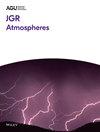Distinct Radiative and Chemical Impacts Between the Equatorial and Northern Extratropical Volcanic Injections
Abstract
Stratospheric volcanic aerosols can affect the global radiative balance and stratospheric composition. In this study, we analyze ensemble experiments with an interactive stratospheric aerosol microphysical general circulation model, designed to assess the climate forcing from large-magnitude explosive eruptions in the tropics and northern extratropics. Previous studies have generally identified a lower radiative forcing from extratropical eruptions from the shorter stratospheric lifetime of volcanic sulfate aerosols. However, our study finds that both the shorter lifetime and lower effective radiative forcing (ERF) efficacy contribute to the lower ERF in the northern extratropical eruptions. The simulated 2-year averaged ERF efficacy in northern extratropical eruptions is 22% lower than that in the equatorial eruptions due to the seasonal mismatch of peak stratospheric aerosol optical depth and solar radiation in the first year after a northern extratropical volcanic eruption. Additionally, equatorial eruptions accelerate the Brewer-Dobson circulation (BDC), while northern hemispheric (NH) extratropical eruptions decelerate the BDC branch in NH and accelerate the BDC branch in southern hemisphere (SH), leading to different spatio-temporal pattern of ozone anomalies. Consequently, dominated by the dynamical processes, equatorial eruption leads to ozone loss in tropics and increase in midlatitudes, while both northern extratropical summer and winter eruptions trigger ozone decrease in NH and increase in SH.

 求助内容:
求助内容: 应助结果提醒方式:
应助结果提醒方式:


